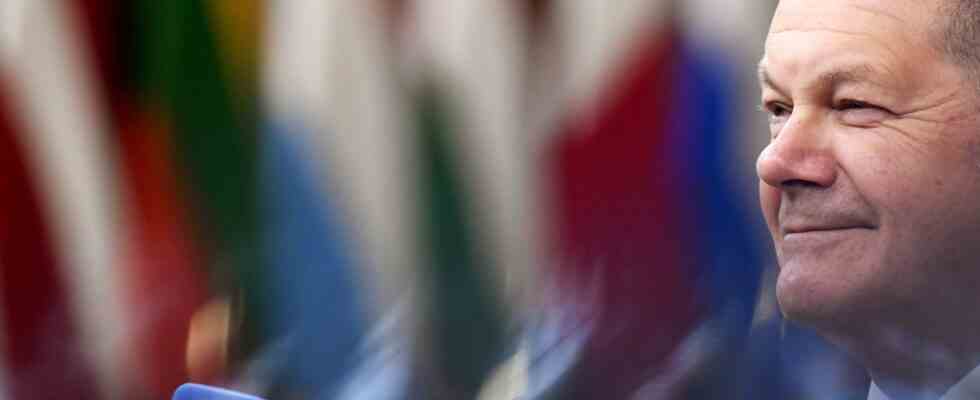Status: 21.10.2022 5:55 a.m
At the EU summit in Brussels, the chancellor had to listen to a lot of criticism because of Germany’s course in the energy crisis. In the end, however, the heads of state and government agree on a joint approach. But there is plenty of room for interpretation.
Ten hours of negotiations between the 27 states on the first day of the summit. This is definitely more than usual. But there are quite a few who consider the marathon talks to be the expression of an almost impossible to overlook atmospheric disturbance that seemed to be hanging over this meeting of EU heads of state and government: discordant notes between the two states that have always been the driving force of the European Union are, at least thought they were.
But now, in the energy crisis, with the still open question of how much and for whom there will be gas in the near future and at what price, in this crisis of completely unexpected force, the differences between Berlin and Paris, between Olaf Scholz and Emanuel Macron, openly revealed at the beginning of the summit.
EU summit discusses common path through the energy crisis
Markus Preiß, ARD Brussels, daily news at 8:00 p.m., October 20, 2022
situation remains pending
“Nobody wants to make decisions where it’s theoretically good afterwards, but there’s no gas – that has to be managed together,” Olaf Scholz said at the start of the Brussels meeting. It was a clear rejection of what other EU countries are demanding: a gas price cap for natural gas imports, but also for those in the liquid variant by ship – LNG imports.
Spain would like such a cap, as would Italy, Belgium, the Baltic States – and France. Nothing has changed since the first day at the summit. Not at the German position either.
In the event that the EU should actually decide on such a price cap, Berlin fears that gas imports to Europe will ultimately fall significantly – which would drive up the price further. But it is precisely against this that the lid helps, argues French President Emanuel Macron and has put Germany in the laces – a little cryptically, but nonetheless clearly and unequivocally.
Despite everything, there is a great deal of unity between the European states today, and I will continue to work intensively with all governments. It is also of no use to anyone in Europe if Germany isolates itself.
The Netherlands and Scandinavians are also skeptical
So said Macron, who failed to mention that some in the EU support the German position, above all the Netherlands, but also the Scandinavians. So you have to negotiate late into the night to show that there is no deep rift in the EU between its two main protagonists.
About caps or non-caps, about at least partially joint gas purchases by all EU states, as proposed by the Commission, about new regulations for the complex gas market mechanisms. And indeed: around half past two in the night, a good-humoured and by no means bleary-eyed Emanuel Macron appeared in front of the journalists in Brussels and declared:
Our most important goal is to reduce gas prices. It’s about mechanisms and price corridors and common trading platforms to protect households and companies. That is our most important goal.
Agreement in principle as the starting gun
One is now much closer to that, says the French President. And for his circumstances, the German Chancellor is in no less good spirits:
We got together in Europe. And that is a good sign of solidarity. We know that the Russian war of aggression has many consequences in the world and in Europe, and this is of course particularly noticeable in the high energy prices.
Word of an agreement in principle made the rounds. They now want to work out concrete measures to curb the high gas and electricity prices, and the energy ministers are supposed to do just that in the coming week.
Scholz and Macron swear by unity
They have agreed on joint gas purchases, they want to curb price fluctuations on the gas market that are just as significant. With a gas price cap, at least that’s what Olaf Scholz says, it will remain difficult. There are still many doubts. And the Franco-German differences? There is no such form, said Emanuel Macron at night.
You don’t always have the same positions, that’s normal. But you continue to work closely with Germany, which is also shown by the planned meeting with Olaf Scholz next week.
There is still a lot to be said
EU Commission President Ursula von der Leyen spoke of significant progress. Europe stay together in this crisis. There were intensive but constructive discussions – with the express will to find a common approach.
Either way, there will still be a lot to talk and negotiate when it comes to the details. This also applies to new joint European investments, perhaps debt-financed as the southern European countries are demanding. It is said that there is still money in various EU programs that can be accessed. But maybe more is needed.
If there is an important signal after this first summit night: there is no rift between Germany and France. And there is the will of all EU states to continue together in this crisis. The only thing that still doesn’t exist is a big master plan to lower energy prices.
EU summit: kick-off with (quiet) discord …
Stephan Ueberbach, ARD Brussels, October 20, 2022 5:04 p.m

